.
.
“Revival” © Kent Ambler.

.
.
___
.
.
“I think it [music] started getting into my blood on them spook-filled Arkansas back-roads after dark when the owls came out hooting. So, when I started taking music lessons I might have already had some idea of what I wanted my music to sound like.”
-Miles Davis, from his 1989 autobiography (with Quincy Troupe), Miles
.
…..Hooting owls were not the only sounds that influenced the young Miles Davis on his walks within his grandfather’s fish farm in Arkansas, of course – in his 1989 autobiography he also remembers overhearing a conversation among a man and a woman about “getting down,” music of the blues and of the church, and someone playing the guitar “the way B.B. King plays.”
…..While all were key to the development of his unique musical aesthetic, his statement about owls is an example of how influential sounds of birds can be to musicians, to artists, to writers, and to poets, as is seen in the extraordinary work of Mary K O’Melveny.
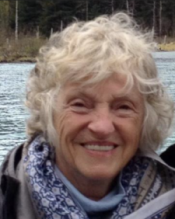
Mary K O’Melveny
…..Like Miles, Mary’s own artistic influences are many and varied. Since she is surrounded by nature and birds where she lives in New York State’s Hudson Valley, the sounds of her environs serve as prominent inspiration for her writing. (She even refers to a pair of nesting bald eagles as “great examples of nature’s poetic genius”). And, while consuming her remarkable work in this digital album of poetry, readings and music, readers will discover that she is also moved by the mastery of legendary musicians, the wings of a monarch butterfly, the climate and political crisis, the mysteries of space exploration, and by the freedom of jazz music that can lead to what she calls “the magic of the unknown.”
…..“Birds, musicians and jazz have lots of similarities,” she writes. “Birds are architects, dreamers, weavers, searchers, travel guides, survivors. They transport themselves (and us, watching them), in ways that often seem magical – from one place to another, from one sphere to another, from one lifetime to another.”
…..Consequently, she writes of woodpeckers, starlings, hummingbirds and flickers with the same reverence she does for Miles, Django Reinhardt, Ron Carter, and Keith Jarrett. And through the likes of these musicians and creatures of our natural world, her poems brim with motion and emotion, sound and silence, rhythm and stillness, beauty and comfort. Her consistently imaginative poetry compels readers to slow their pace and meditate on the wonders of the world with heart, passion, and measured disquiet.
…..Mary’s poetry has moved me since I was introduced to it in the spring of 2022, so I publish this collection with great enthusiasm and joy. My wish is that your encounter with it allows you the chance to experience her unique and soulful poetic journey and, I hope, discover your own joy.
.
Joe Maita
Editor/Publisher
.
.
___
.
.
A word about the art within this collection
The South Carolina-based artist Kent Ambler has graciously consented to have a sampling of his work published within this collection, for which Mary and I are most grateful. His work is a beautiful compliment to her poetry that connects nature and music.
To view more of his work, please pay a visit to his website by clicking here. His more complete biography can be found at the conclusion of this album.
.
.
(To distinguish from her poetry, Mary’s personal narrative is italicized – and in bold – throughout the collection)
.
.
_____
.
.
“Backyard Bird Count” © Kent Ambler.
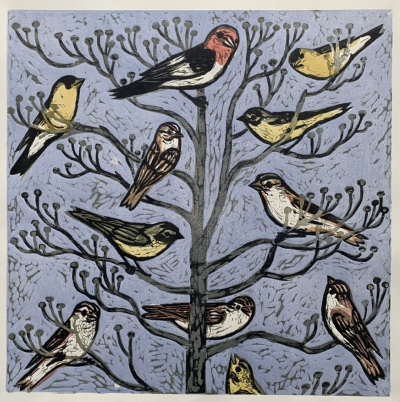
.
I have been writing poetry since happily retiring from a long, busy career as a labor rights lawyer. My desire is that my poetry helps readers pay closer attention to our connections with others, our mutual needs for love and understanding and the importance of appreciating and honoring the natural world that is our mutual home. The more time I spend in nature, the more I want to convey its wild and wonderful musical reality. Empathy should be our sound track.
I am fortunate to live in New York State’s Hudson Valley region in a place surrounded by nature: trees, water, songs of wind and rain, birds of many varieties and other diverse creatures (think bears, deer, coyotes). Our nearest neighbors for several years now have been a pair of nesting bald eagles. They are a great example of nature’s poetic genius.
.
.
Hudson Valley Lullaby
A mewing of catbirds
has landed in my lilac bush
at the corner of the porch.
If one listens closely,
it sounds like Birdland or
The Blue Note filled with
Kool Kats – Dizzy, Monk,
Count Basie, Charlie Parker,
Lester Young. In charge
of sound and syncopation
is Pee Wee Marquette.
Symphony Sid sends out
the tunes. Everyone stops
to listen. Bring along a drink
with a parasol. They will
sing us a Broadway lullaby
as the sun drifts away
like a final, fading A note.
.
___
.
To Be Blessed
To be blessed, I always thought,
was like being able to walk on water.
A miracle of positive thinking.
Everyone around you sinks,
arms and legs thrashing like cymbals,
while you still hear the sun’s orchestral chords.
To be blessed, on the other hand,
was what the sales clerk said about the day she urged you to have
after she wrapped your holiday gifts and tied their bows.
To be blessed was to have your best friend of 45 years
remember your name again as you walk with her
through once lovingly planted lush gardens.
I can still see her lavender and lupine,
laurel and lobelia. I shade my eyes against
the shine of orange Koi darting past lotus blossoms.
To be blessed is to see two eagles nesting in a treetop
as I drive home from running errands,
amidst radio chatter about terrifying times to come.
To be blessed is to listen to Miles Davis
Kind of Blue and Sketches of Spain
as calm and cool as neon moss against my cheek.
To be blessed is knowing that even the fierce rage
that fills my body like fire climbing walls
might be tamped down if I took a walk in my woods
past our stream and its little waterfall.
As my boots kick leaves away, I head for the pond
where walking on water seems possible. Even flying.
.
___
.
What Kind of People Write About Birds?
I love to write about birds. What might this mean?
White skin privilege? Classism? Failure of nerve?
Cluelessness about those marathon human tragedies
circling our globe like murders of crows?
Some days everything causes me to weep.
Our grass is filled with great lakes of water.
Our purple martin house lists in the meadow,
pushed aslant by frozen ground.
Will it right itself by April or tumble
over like a fallen statue? Its prospective
tenants will have flown hundreds
of miles each day without a stop.
Two bald eagles at the edge of the woods
are keeping score on poetic justice.
Their nest is filled with tiny twigs, moss
and hollowed bones of trout, moles and kittens.
Nature’s cruelty can be just as stark as ours.
There is a tiger moth that drinks the tears of birds.
Imagine what a bird’s shadow signals to someone
locked away from light. Each year, birds traverse
skies filled with obstacles they did not make.
They do not over-think their options. In August,
a ruby-throated hummingbird drank from our feeders.
By December, her wings whirl in Panama.
.
…….[Previously published in Beltway Poetry Quarterly (2023)]
.
___
.
Piano Man*
A blind bull elephant,
his mouth full of barna
grass, picks up his head, turns
toward the sounds of Bach
scaling mountain breezes
like a snowy egret.
Another, tusks broken,
toenails slashed like tires in
a junkyard, stops mid-climb
to lift his heavy trunk.
He sways with a chorale
like a seasoned conductor.
More gather by the man
at the wooden upright
he has planted in the
bush as gently as if
it were a parlor salon
where draperies rustle
and crystal goblets clink.
Soon Mozart joins them all
in an arc of pink gold
sunset and softening air.
Nothing holds them here but
a pianist’s nimble hands.
Before forest havens
vanished, they ruled with
resonance. Perhaps these
notes call back tales once told
in jungle darkness, as stars
riffed, trilled, danced above them.
.
…………[Previously published in Split Rock Review (2019)]
.
*Paul Barton regularly plays piano for blind, disabled and psychologically damaged elephants at Elephants World, a wildlife sanctuary on the banks of the River Kwai in Thailand
.
Listen to Mary K O’Melveny read “Piano Man”
.
.
Love Nest
As spring’s heart flutters toward summer,
I have fallen hopelessly for two bald eagles
who sit atop a tall dead pine
scanning our reservoir’s dinner menu
for their nesting babes. As the hour darkens,
they calculate the weight of prey.
My schoolgirl crush extends to their nest
which fits just so below the crown
of a tall white pine that marks
the far line of our property.
Their cone-shaped aerie looks delicate
only to visitors stranded on ground.
I am a fool for once unruly branches
woven and knotted like an heirloom
crazy quilt, innards softened by moss
and grass and cornstalks, encircled
by fallen feathers and stray down.
I am in awe of the way the pair
have built this refuge together,
bonding like decorators
over each string, bone and twig.
I am awed by each year’s remodeling,
A visual scrapbook of each chick
hatched, fledged, branched, launched.
I adore how each parent warms
the egg, shares the hunt, tears
apart the food, protects the brood,
teaches wind drift starscapes,
flight patterns. Most of all, I am mad
for their passion – how they return
each season, faithful and filled
with ardor, how they plunge, dive,
swoop, cartwheeling erotica as new
as in their earliest days, as if they
did not know of winter’s perils.
As if happy endings always arrived.
.
…………[Previously published in An Apple In Her Hand (Codhill Press 2019)]
.
.
Listen to the 1957 recording of Chet Baker (trumpet) performing “Love Nest,” with Russ Freeman (piano); Leroy Vinnegar (bass); and Shelly Manne (drums). [Universal Music Group]
.
.
If I Were a Monarch Butterfly
I’d play Django Reinhardt’s
gypsy jazz as I traveled.
Like Romani everywhere,
my roots are temporary,
my wings all swing,
my story backed
with chords and strings.
I’ve no need for percussive beats
to keep me aloft as I glide
through air like flecks
of sunlight adrift on morning
tides. I need to hear the lilt
of violins, acoustic guitar
arpeggios. Wind shear keeps
me going from milkweed
to magenta cone flower
to golden jungle marigolds.
My background story plays
as glissando. Hold each
chord tight, then free it
to slide, soar. Follow me
from hot club to blues bar,
from waltz to swing, across
boundaries and border walls,
from Clouds to that elusive
Mansion of Our Dreams.
.
.
_____
.
.
“Enchanted Woodland” © Kent Ambler.
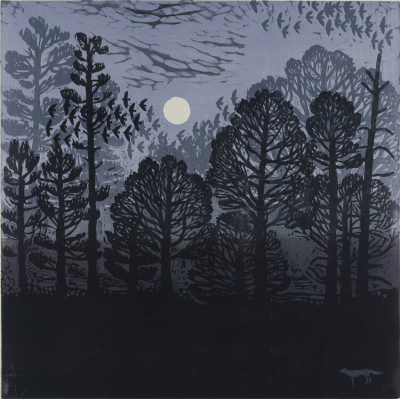
.
One of the things that first moved me about poetry was its musicality – the sounds, cadence, meter – how it appeals to all of our senses. The idea of taking off from a blank page without really knowing where you may end up is very similar to jazz in so many ways – the way that one never really plays (or hears) the same things twice even when the song is the same. And the freedom of it – the magic of the unknown, the way it can transport a listener/reader to an entirely different world, maybe even a different universe.
.
.
What Music Can Do
When I hear Sketches of Spain or Kind of Blue – Miles Davis masterpieces from his earlier career– I am always calmed, thrilled by the ways that music can take over every portion of a person from head to toe, from inside to outside, from innermost mind to outermost layer of skin. It is always hard to imagine that the musician creating these soothing, haunting, calming ethereal sounds was so filled with torment and trouble, so violent (especially towards the women in his life). And toward himself in many ways.
How does such a contradiction occur – the mix of creative musical genius that can silence a room by way of gorgeous notes that slither around a listener like a silk scarf or soft velvet cape and heavy inner angst that can cause agonizing pain. It has been said that “music soothes the savage beast.” So why did it not soothe Miles Davis? Or perhaps it did. Maybe Miles woke up every day, knew that the only way to calm his inner demons was to play trumpet from dawn to day’s end, long into a smoke-filled, drug-ringed night. Maybe this was the only way he could survive in his universe, filled with constant forces working against him.
Perhaps Miles was saved from greater despair by playing in protective company with other greats like Charlie Parker, Dizzy Gillespie, Bill Evans, Jimmy Cobb, Paul Chambers, John Coltrane. So many brilliant musicians who made our lives greater as they blew horns, flutes, as they drummed out beats, as their fingers embraced keys, frets strings, as they whispered to us in darkened rooms about ecstasy and passion. They provided reasons each day to dance, dream, devour life all day long instead of being devoured by it. Like birds soaring high across troubled landscapes, feathers outstretched above raging storms.
.
___
.
I Will Fly In The Morning
One day I’ll fly away/leave your love to yesterday/ What more
can your love do for me?/When will love be through with me?
“One Day I’ll Fly Away” lyrics by Joe Sample & Will Jennings
.
Some days it doesn’t pay to get out of bed.
It’s raining all the way from the moon in here.
A person can stay up all night, every night,
and still be inspired by desire. Every nerve
a spark of electric light, flashing on and off
like some old red neon bar sign. My flight dreams
have been parked too long at the corner of Sorry
and Yesterday. You’ve had it good. I’ve got it bad.
Who can say which feels worse? Today, I must
decide. NASA is heading back to the moon,
this time on a ship called Artemis. But I’ve had
my fill of lunar landscapes. Instead, I’ll head
for the Orion Nebula to watch technicolor stars
forming, their wings outstretched, ready to soar.
.
___
.
Live at the Bohemian Caverns
…Remembering Ramsey Lewis
I was there to see The Trio:
Ramsey Lewis, Eldee Young,
Red Holt. The darkened space
lived up to its name. It felt edgy,
sophisticated, high voltage.
I held on tightly to my fake
ID, newly minted for a college
freshman. I tried to appear
nonchalant. As if I was used
to sipping vodka and tonic
at tiny, crowded tables
bordering a small wooden stage
backlit by faded stalactites.
Once a speakeasy, now home
to musical stars an arm’s length
away. The three musicians
shone like the sun as they played
familiar pieces but with a
different rhythm, a novel turn.
A West Side Story medley
took Sondheim to another realm.
Tennessee Waltz was not a
waltz at all but a toe-tapping
farewell to mismatched love.
Space travel was on our minds
back then. Fly Me To The Moon
anytime I said. When the set
ended, I walked outside on U
Street, amazed by how little
I had known about the magic
of jazz. I became a lifelong fan.
I kept that album around for years.
It reminded me that, if we
listen up and are willing to fly,
we can become lifelong members
of The In Crowd where everything
we think we know can become
bold, bedazzled, brand new.
.
___
.
Whenever I Hear The Köln Concert
I remember the time I stopped mid-
sentence as Keith Jarrett’s Köln Concert
played on my radio. I felt room’s air
turn electric, as if there was no more
need to turn on lights or speak in just
one language. As if one could repeat
a thought and each time make it better,
vibrant with new meaning, each riff
and vamp more insightful, urgent
than the last. It was jazz. It was classical.
It was blues, gospel. It was cinematic,
operatic, yet fiercely intimate as a first kiss.
Later, I learned that the first performance
at Cologne’s Opera House took place
on a substandard rehearsal grand piano.
Its pedals weak, its sound tinny in bass,
thin in upper registers. Jarrett enhanced
its middle keyboard with ostinatos, rolling
left-hand rhythmic patterns, rubatos.
One hears cheers from the late-night audience.
The Köhn Concert album set records.
For years, musicologists begged Jarrett
for an official transcription. Even after
he finally agreed, he endorsed that
original performance as the best guide.
Isn’t this what we all really want from
our lives – to learn improvisation, to trust
imagination in the face of unforeseen
challenges, to transcend our circumstances,
to create miracles, one rendition at a time.
.
___
.
Sketches of Spain
I’ve never seen much of Spain.
A business trip to Barcelona.
A commuter ride to Girona. Salvador
Dali’s museum. A stop in Sitges
where ivory beach sand abets
a shimmered turquoise sea.
Thanks to Miles Davis and Gil Evans,
Spain is always at hand. When I
want to see a world beyond my own,
this is my ticket. I need no plane,
no ship, no train. All is need is here.
In my living room. On vinyl.
Concierto de Aranjuez moves, soothes,
sings, singes skin. Like a slow burn.
Like a hot streak. Flugelhorn born again.
Reborn. It slithers, sails, seduces.
Ancient guitars replaced by supple,
silvered horns, silken ribbons of sun.
Sounds hovers in the air like ghosts.
But we welcome their caress.
We want to reach out, leap upward.
In the distance, beyond our vision,
drumbeats pulse, castanets whisper,
bells ring out prayer tapestries.
Tambourines echo. Soft. Subtle.
Chords rise like clouds. Strings tease
us, tempt us. In Saeta, an Andalusian
folk tale calls us to processions along
cobblestoned streets, veiled in lace
mantillas, in praise of ways that god
finds perfection hidden beneath clay
tiled rooftops, whitewashed walls
or peeking out from an earthenware
pot filled with crimson carnations.
Mosaic tiles lavish us with legends,
each spot of color radiant with meaning.
Will ‘O the Wisp spins, weaves,
waves farewell to phantoms
we no longer need or want. Next,
Pan Piper translates a dialogue between
between flute and horn, past and present.
We hear what we crave, not what exists.
As we proceed, new languages form.
We cradle them like precious gems.
We learn to appreciate their luster,
linger over each new conjugation as if
it was a just-discovered constellation.
Listen carefully, savor notes of love, loss.
Solea transports us further across new
continents. We pursue desire in every note
in every pulsing phrase, every tone, trill.
Combustion points of light and dark
simmer beneath chambered corridors,
soaring cathedrals, stained glass archways.
So I must don my cinnamon red flamenco
dress, hold up my pear-shaped castanets,
black as onyx, stomp my stiletto heels.
As I flounce, phosphorescent chiffon ruffles.
I am suddenly as brassy as a rose-colored
flamingo. Watch me spin, twist, swing, soar.
.
.
Listen to the 1960 recording of Miles Davis performing “Saeta,” from Sketches of Spain [Columbia/Legacy]
.
.
Confessions Of A Wannabe Torch Singer
Haven’t you wondered about road life
as a music groupie always traveling
to someone else’s schedule.. no matter
it is still a thrill to know each chord
of your life’s boundless sound track
without having to curate it alone
Think of all those moments when music
whispered in your ear like a slow burn
how you yearned to follow that steamy heat
to grab hold of that sizzled downbeat
that jitterbug flutter of wings that turns
out to be your heart as it sings yes yes yes
Or maybe it is even better to linger
on some Crescent City streetcorner
imagine crowds saying listen to
that singer.. she’s torchy as a blackbird
as heads turn …words cease… as they toss a dollar
or two into a cardboard box that once held
bus schedules faded autographs
dogeared programs …ticket stubs
.
.
_____
.
.
“Night Song” © Kent Ambler.
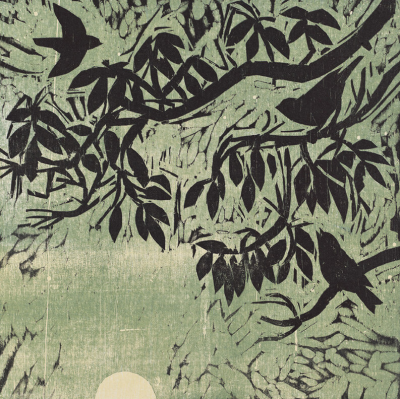
.
Birds, musicians and jazz have lots of similarities: birds are architects, dreamers, weavers, searchers, travel guides, survivors. They transport themselves (and us, watching them), in ways that often seem magical – from one place to another, from one sphere to another, from one lifetime to another. Each year, we are losing birds at alarming rates to climate change and other human-made misfortunes. When they are absent, the world is a vastly different place.
.
.
Sounds of Music When Birds Have Left Us
Three billion birds have disappeared
like proteins gone missing
in a brain. Bachman’s warbler,
preserved in hazy photographs.
Or Mozart’s starling, said to have
inspired his Seventh Piano
Concerto. And ascending larks,
as inscribed by Ralph Vaughn Williams.
The Cetti’s warbler
whose trill inspired first notes
of Beethoven’s Second, its last
movement filled with dainty chirping.
In Respighi’s Pines of Rome, a
nightingale dazzles. Now there are fewer
song sparrows, blackbirds, doves,
whooping swans and finches
to echo wind serenades.
Where will music go
when skies have emptied,
when memory no longer holds birdsong?
.
Listen to Mary K O’Melveny read “Sounds of Music When Birds Have Left Us”
.
.
Who Can Hear A Love Song?
The Kauai O’o stopped singing
decades ago. Its lilting, bell-like
sounds drifted like silken strands
through jungle forests, lifted air
in humid wetlands, shifted rainbowed
skies. One hopeful mating call can
still be heard on tape. The last male
chirps, whistles, sighs for thrill of
romance. The female, dead five years
now, will not reply. Still, his voice rises
through mist and rain. Bright yellow
feathers shuffle against dark brown
plumage as he shifts long legs to better
amplify his song through tangled vines.
As he tries to court her with twinkling
trills of music, does he ever question
why silence is her sole retort? Or does
he, like poets everywhere, design words,
stir, spill, spin them aloft, in prayer
that a passionate audience will appear.
…………[previously published in Chronogram (Summer 2023)]
.]
___
.
Confessions of a Casual Bird Watcher
This late October morning, I ventured out for a walk
along our creek where rose pink golden leaves saw
their future selves twisting and bobbing, pierced in halves
and quarters like scattered coins. The day began raw,
the way late fall can evoke a tear, like dew
or a lamentation. I passed through fronds of grass
once home to purple martins feasting on a wall
of milkweed. I moved aside to let our old tortoise pass
(he’s lived here longer than me) and sensed his eyes
were also clouded by sadness. Above, geese headed abroad
following ancestral cartography. I wondered if they thought
about how earth transforms each year or just flew ahead,
unquestioning, into thinning layers of blue. No one is cautious
enough these days, especially birds. Habitats thin, each crumb
powders, drifts off – dispersed like a billion feathers
silenced. Songbirds of every octave were once at home
here. Now, they are faint memories bleached bone white as ocean reefs. Sequoias, Rubberwoods, Kapoks have formed a jagged seam
across the planet, no longer able to offer shade from a hot noon
sun. I want to join the leaves in my creek for a swim.
.
___
.
Murmurations*
My friend and I are talking indignant politics
as we head across the Mid-Hudson bridge,
steel sky above, chilly water below,
when a cloud of birds twists, spins above us.
They seek every bare branch, fill them
as if they were summer leaves, then scatter
again like confetti in wind. No one is in charge,
yet balance animates all.
Like scat singers, each vibrating note resounds,
rebounds. Each airborne thrum and trill,
purr and prattle sweeps the skies, harmony
clear, like a drummer’s brush technique.
Their grace is a loose coordination:
Swing. Smooth. Bebop. Hip Hop. Cool.
Aerial musicians in synchrony, each linked
to the next. We discontented humans drive on.
.
*Murmuration is the name given to flocks of starlings flying together in coordinated, whirling, ever-changing patterns
.
…………[Previously published by Allegro Poetry Magazine (2018)]
.
___
.
Bird Watcher’s Diary
a staid sport …enjoyed by the few but fervent
fresh air. wooded glens .winding trails
binoculars. strapped like necklaces
spotting scopes ready to deploy
telescopic lenses …tripods
field guides …notepads
pens in jacket pockets
citronella and peppermint
veterans recite tales of hopeful sightings
look …over there …could that be
a cedar waxwing …partly hidden …on that back branch
quiet …isn’t that a hooded warbler serenade
just up there …a northern flicker
did you see the long-eared owl … the horned lark
a ruby throat …a grey cheek …a rose breast
an orange crown …a blue wing …just last week
yet somehow …on a sun-dappled .afternoon
in the Ramble …birding while Black
proves as challenging …as night driving
or Skittles buying …or cigarette selling
an unleashed dog …an unhinged woman
talking turns to trauma …to terror
once again cell phones tell the story
this ending better than most …no mourning doves
.
.
Watch a 1968 film of Nina Simone performing Paul Simon and Art Garfunkel’s “Sound of Silence”
.
.
Savoring Winter’s Silence
The snow slips, slides, slithers away
from a steel grey sky like soft tears.
All is coated in white as far as anyone
can see. Mounds of downy fluff mix
against stark, darkened tree trunks.
Most are pines savoring their last
stand like a ragtag group of soldiers
who have just heard rumors that
an armistice may arrive soon.
As fat, lacy flakes drift sideways
from treetop to limbs to forest floor,
all is voiceless as a childhood dream.
Hold your breath and you might hear
a faint song as it echoes softly within
the bright, feathery hush of early
morning’s translucent light. Perhaps
a snowy owl, a red-crested woodpecker,
a bald eagle. They too respect quiet.
Soon all edges soften, glacial rock
remnants turn fuzzy, frilly, formless.
Everything is powdered in chalky velvet.
In this serene stillness, we seek forgiveness
for pretending, for a few sumptuous moments,
that all might bode well for our weary world.
.
.
_____
.
.
“Midnight Gathering” © Kent Ambler.
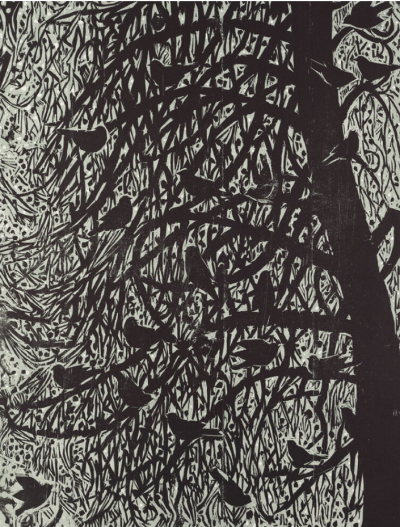
.
Jazz and poetry both have a vibrant life beyond what appears on a page or on a stage. I was fortunate to have lived in New York City’s Greenwich Village for several years where I heard many jazz greats in person – Ron Carter, Jim Hall, Blue Mitchell, Yusef Lateef, Miles Davis, Cedar Walton, among them. I even got to meet Duke Ellington in person at the Rainbow Room! Later, I was able to spend time in New Orleans at JazzFest and at other venues where music infuses every street, scene and walk of life. My poems often arise from the thrill of these embedded memories or listening to recordings that bring them back.
.
.
Rainbow Room Reverie
What ever happened to supper clubs?
White tablecloths and sparkling champagne
flutes clinking like wind chimes. Places
where the air is singed by electricity
of romance and a smile heats up a room?
Blossom Dearie singing I’m In the Mood
for Love while waiters hover silently,
awaiting a nod for refills. White dinner
jackets, peach, lavender satin dresses swirl
around a parquet dance floor as Duke plays
Caravan and It Don’t Mean A Thing.
Everyone swinging to the sultry beat.
An evening out, not just a meal. A place
where cigarette smoke mingles with L’air du Temps
and charismatic bandleaders wink kindly
at young ladies who sing along as if their life
was always this fancy and swell. The Cotton Club,
the Copa, El Morrocco. Where everyone knows
a stellar story that’s good for a laugh. Where
each patron has the same chance to dream
that the night’s magic will linger like a
a determined lover. Where memories
will whisper gently long after morning alarms
jangle and grey subways shriek like crows.
.
___
.
Big Mama Thornton
Here’s the good news
She loves EveryBody
Makes wallflowers into dancers
She shakes ..shimmies
Don’t get shook up
Don’t fight her charms
She’s sittin right here
Blues walkin on my bed
Lookin out at the rain
Blues all round the room
She croons.. spoons ..blooms
Come on honey
She’ll take care of you
Don’t fret …don’t fight it
Mama’s right here
She gonna love you right
She’s sassy she ain’t no sissy
She’s spirit … spirited … spiritual
Wade in the Water
She’s wadin .wailin
waitin. wantin
Don’t miss out Don’t mess up
Big Mama’s comin
She’s gonna fix what ails you
Let her try ..why not
What have you got to lose
You – sittin by the window
Blues in your pocket
You can be her hound dog
not her ball and chain
Everything gonna be alright
You know she’ll love you forever
.
.
Listen to the 1989 recording of Ron Carter (bass) and Cedar Walton (piano) performing Rodgers and Hart’s “My Funny Valentine” [The Orchard]
.
.
Quartet for Ron Carter
I.
Art’s Song with Winter Birds
Ron Carter plays double bass
as ruffed grouse wander across
a thick pine forest like ribbons
of smooth sunshine… they hum
thump… strum… low noise drifts
Art Farmer’s trumpet riffs
as a red-breasted nuthatch trills
a bohemian waxwing chills
notes blow high… higher … higher still
follow them… can you even see
where they are heading… they burn
turn … drift above the creek… slide
skip through cold air … sweep back down
hip hop be bop flip flop non stop
Cedar Walton’s keyboard enfolds us
like a pair of black-eyed juncos
in white cold air … a streak of light shifts
fingers whirl sidle side to side
mellow whispers turn emboldened
round rich sound floats back down
you must remember that night
downtown at Sweet Basil
when love was new …when music flew
soared above us like winter birds
II.
My Funny Valentine
…don’t change a hair for me/not if you care for me (Richard Rodgers/Lorenz Hart)
nobody plays romance
like jazz great Ron Carter
even if you thought you knew it
you never heard it sway this way
slow …lazy …hazy …crazy …sweet
forget words … they mean so little
this is love’s mother tongue
syncopations with emotions
a gentle kiss of strings
a torrid trill about thrill of loving
a bevy of chords …whisper
breaking through darkness
like a strawberry moon
don’t ever doubt yourself … ever
don’t change a thing
III.
Candle Light
this is our tender time
brush your hand slow
across my face
soft as a peony petal
as candles flicker
a single flower shifts
in dancing shadows
smile at me flirt with me
chords envelop us
shift like woven silk
tomorrow we know
we must be somewhere else
too harsh too bright
without subtlety or layers
tonight is our night
of candles burning
IV.
Live at Village West
footsteps on the pavement
traffic whizzes… sizzles past
sirens … whistle… bristle
everyone hustles … hums
crowds scuttle … scurry along
we are all in a hurry
to get to heaven
in a Village bar
a guitar man jams
a tall man on a bass
fills sacred space with strings
chords sing … sting … swing
soothing… smoothing us
there are no old standards
any tune you ever heard
is something brand new here
brightest blue here
when you come in here
please eschew
all your expectations
preconceptions
silence please … listen up
what happens here
will never dare be in the air
in the same way again
.
Listen to Mary K O’Melveny read “My Funny Valentine”
.
.
Where There Is Heat, There Is Light
…For Harry Belafonte: RIP
My first crush. As a pre-pubescent, shy girl,
I did not know what to make of feelings
that surged through me when I first saw him.
Lit up on stage, he radiated heat, light, pulse.
I would have sworn our eyes locked as I sat
spellbound in my outdoor amphitheater seat,
pulled toward his presence at center stage
like a reeled fish. The beat sizzled. He sang
of boats, bananas, hard work, new days, old loves.
My grandmother sat next to me. Perhaps she smiled
as I nearly swooned to rhythms, tambourines,
steel drums, rarely moving my eyes away
from him as shades of rose enveloped my cheeks
while I dissolved in passions stirred like a spicy,
fragrant gumbo. I felt he could see me as I gave in
to raw desire, to tropical dreams calling me home
to unending turquoise seas and shimmering sun.
Later in life, Belafonte was found wherever
fairness needed a friend: civil rights marches,
anti-apartheid rallies, racial justice speak-outs.
He traveled the world for peace, prosperity, redress.
His career in theatre, film, song, television shed
light on myriad ways humanity might improve.
His lilting, husky, voice was always urging us
to be better than we had been, to reach higher
toward a world where everyone might shine.
Once, at a benefit event, I even got to meet him
in person. I confessed that he had been the first
to catch my heart as it shivered like a hummingbird.
He was kind. Held my hand for minute. Smiled
as if we might be friends. As I time-traveled back
to that theatre in the woods, I realized that love
is just another word for how we use our own light.
.
.
Listen to the 1955 recording of Ahmad Jamal performing “Poinciana” [Columbia]
.
.
The Spaces in the Music: Homage to Ahmad Jamal
Bach and Ellington … Mozart
Art Tatum … Ravel … Erroll Garner
Beginning at age three
He knew them all like old friends
He loved the space that music made
The room it gave to feel …to grow …to glow
The spareness …The richness …The fullness
Everything rhythmic …lush … hypnotic
Poinciana …But Not For Me
Ahmad’s Blues …Marseille Pastures
These songs embraced our lives
So we could …riff …rap …evolve … fly
Some say there was never a piano like his
If you were lucky you caught him at
The Pershing …The Alhambra …The Village Gate
Swing …Color …Sweet …Cool …Spirit …Clarity
Pianist extraordinaire …Composer …Bandleader
He taught us how to traverse the world
To watch the sky as it fills with birds
To hear the wind whisper between every chord
..
…………[Previously published by The New Verse News (7/13/2023)]
.
.
_____
.
.
“Fall Trio” © Kent Ambler.
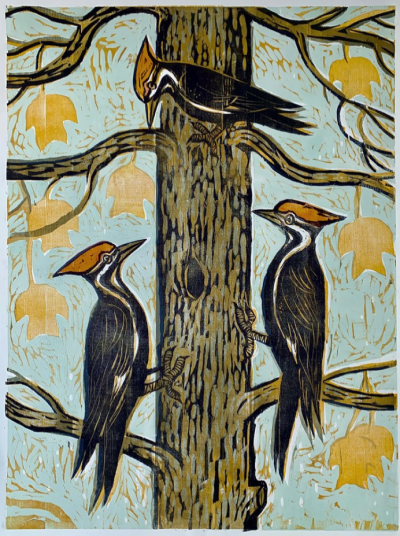
.
As a child, I was introduced to Henry David Thoreau, whose writings about the natural world were so beautiful and poetic – they encouraged me to look more closely at the many wonders of our environment around me and the breadth of its non-human inhabitants. Although I did not start writing poetry seriously until I retired, poetry and music – like nature – have always been a source of inspiration, comfort and wonder to me.
.
.
How to Write a Woodpecker Poem
.In writing your poem, tell the truth as you know it. Tell your truth.
Remember that poetry is life distilled.
…Gwendolyn Brooks
I.
I thought Jack DeJohnette had set
up his drum set in my back yard.
A woodpecker the size of a mallard
hammered its beak into an old apple tree.
Its head was red as a ripe Heirloom
tomato. Black and white feathers shone
like sequins against a lava crest
as the bird curved in and out, used its
ivory beak to carve through mottled
bark in search of sap, nuts, beetles.
With each rat tat, rat tat, rat tat call,
each knock, knock, knock, knock, knock
reply, a tree transformed to sound stage.
The more I watched, the more it seemed
as if a Diva drummer had settled in
for a long gig – Nikki Glaspie, Bobbye Hall,
Terri Lynne Carrington. Like a starstruck fan
at a stage door, I ventured closer in hopes of eye
contact, maybe even a selfie. True to her star
stature, she granted me a measure of time
before lifting away from echoes of her performance.
As she sailed off into the pine forest,
I sensed kinship more than spectacle.
Each day I wait for one more crimson splash,
for those percussive beats of our rhyming hearts.
II.
Editorial feedback sucks sometimes.
My editor critiques my ode to a giant
woodpecker that briefly transformed
my Woodstock yard into a drumbeat-rich
concert venue one sparkling summer day.
Her redlined marginal notes say
I am waiting for the poem to be more,
to move beyond describing that woodpecker.
But, I thought, wasn’t that the point?
A morning had begun like any other –
coffee in hand, bad news emblazoned
boldfaced in the not-so-fine print.
I nursed aches, grievances, ticked off lists
of chores, demands, regrets. I sighed
at how time raced by, even when one feels
encased in amber. And then, in one sudden,
swirling, sonorous blaze of red, black,
white, an ordinary day turned to jazz fusion.
III.
I am long, tall, talented. Dressed in my best
onyx and pearl finery. My head’s as red
as Judy Garland’s Oz shoes, which one
might think I’m wearing as I tap, tap,
tap my way across this apple tree.
You could have heard me miles away
if you took time to look past deafening
daily news drumbeats. I beckon you
outside, to join me as I move, sway,
gyrate, groove like Buddy, Max, Art
from branch to branch. Follow my lead.
You’ll hear music everywhere. We’ll pirouette
across this leafy stage to grand applause.
Today, you will believe in reincarnation.
.
___
.
Remembering “Trees”……………..
a poem as lovely as
a robin’s nest as
a branch as snowy as
a mouth as
a limb as sturdy as
a breast as
a prayer as
a god as
joyce kilmer was
the first poet I ever
knew about
a rare bonding event
with my father
as we stood
in a pine forest
on a cold fall day
as I shivered
watched starlings soar
and colored leaves
roll around like fiesta marbles
my stern father began
to recite each word
soft sweet
like a flower seller
he had me repeat
each line until I knew
more than
I had ever known
about trees
or god
or the breathless magic
of poetry
.
Joyce Kilmer’s poem “Trees” was first published in 1914. Kilmer died at the age of 32 in World War I. He wrote three books of poetry.
.
___
.
Birds of Paradise
They look like birds.
Long lime green legs.
Bright orange floral
fans shaped like wings
with delicate tufted
royal blue fronds.
Poised for air travel
like slender cranes.
How many times
have they hungered
for lift off? How many
moments of desire
have they entertained
to soar closer to the sun,
to dance with clouds,
to sing stories to stars?
As Earth’s sun reddens,
meadows parch. Flood
waters rage through city
streets, homes. One wonders
if that desire to fly quickens
like a rapid pulse as time
to escape evaporates
like vanishing coral reefs.
I want to pretend I am
a sunbird or yellowthroat
landing on their flower
base in search of pollen.
Once there, I will whisper
to them, gentle as a zephyr:
Tell me your flight pattern
so I can follow behind you.
.
.
Listen to the 1947 recording of Charlie Parker performing “Birds of Paradise (a.k.a. “All the Things You Are”) [The Orchard]
.
.
When Birds Get Together, It’s All About Music
A flight of swallows sweep up after
a murmuration of starlings, as blue skies
turn to night shadows. Time for dancing.
A charm of goldfinches scatter like
ancient coins. Their splashy notes spill
over a fountain, down its falling waters.
Listen to a string of Canadian geese as they
fly north for summer’s light. They sound
like a brassy band doing a second line.
Have you ever seen such flamboyance?
say the electric pink flamingoes
as their long legs lift up like Rockettes.
A ballet of trumpeter swans swoons
around a pond. Dizzy, Louie, Freddy
Wynton and Miles at a jam fest.
Maybe they are backed up by a bellowing
of bullfinches. Or a clattering of jackdaws.
With a clamor of rooks for emphasis.
That old band of blue jays keeps truckin on
to new venues, reconstituting one-time hits.
How long can they keep partying on?
A descent of woodpeckers drum
their way down a dead pine’s trunk,
one rat tat tat …rat tat tat at a time.
A round of robins finds fortune in hidden
spaces. Each time a worm emerges,
another chorale rings, shines, spins.
Hummingbird charms whirr and whirl
faster than fingers can snap. Louder than
a clattering of colorful cockatoos.
A chime of wrens keeps everything full
of magic, music, mystery. Everybody claps,
prances. There are no flocks of wallflowers.
.
___
.
A Monarch Butterfly Poses Some Questions
Do you remember the noise of my wings?
A lace veil as it flirts with a summer breeze.
A blade of grass as it shakes off morning dew.
In Mexico, a million of us sound like waterfalls.
At rest, we cling to tree limbs like gold, onyx,
ivory jewelry that has been hidden from thieves.
We fly high above sleeping migrants everywhere,
whose hopes pirouette in zephyrs and exospheres
as they dream of flight patterns to safety.
Do you recall the first time you saw one of us?
How you were awed by our delicate wings, how
we landed like a first kiss on a purple cone flower?
How you imagined what it would be like to float,
unfettered, without apology? Without accountability?
How it takes so little to ignite imagination’s fiery call.
Our journeys from your garden to jungle sanctuaries
span generations. Some days the ground is littered
with scales that resemble coins from Spanish galleons.
I have been airborne for 2,500 miles. I have traversed
obstacles my ancestors never knew: poisoned fields,
droughts, drones and planes, wildfires, clearcut forests.
Still, think of that moment of lift, when air currents
lick your skin as a lover might. Always optimists,
we remain your ardent guides to Elysian Fields.
.
.
_____
.
.
“Evening Chatter” © Kent Ambler.
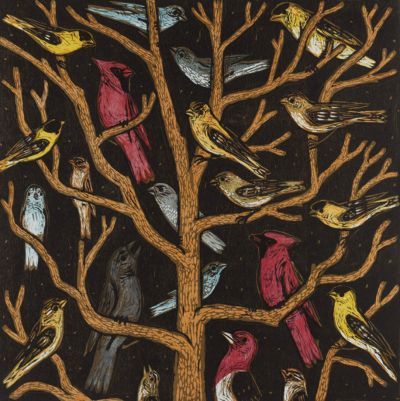
.
I wrote some poems in college, mostly influenced by “Beat poets” like Allen Ginsberg and Lawrence Ferlinghetti. Back then, it was more about rhythm and music. So much of what we carry around in our heads (good or bad), and the way we see the world can be influenced by a great song or jazz riff. Once I started writing poetry, the connection between poetry and music/song seemed evident, even obvious.
.
.
Saying Goodbye to Lawrence Ferlinghetti
Lawrence Ferlinghetti lived much longer
than my college friend Page who sat
with me in empty classrooms
memorizing A Coney Island of the Mind.
We dressed up all in black
from felt berets to cotton stockings.
I had bongo drums. In case someone
missed the point about the Beats.
We imagined our lives on the road,
How we would howl at injustice
as we circled the globe in an old
Hudson, how we would sit at our Royal
typewriters where words would tumble
out like flocks of sparrows and everyone
would envy us, admiring how we tossed
conventions away like so many breadcrumbs.
We imagined faces rapt with attention
on uncomfortable stools in some dingy
West Village club while we proved hip,
spoke of moonmad swans and falcons of the inner eye.
Soon we would be off to City Lights
where our own words would stop a show cold,
goose bumps forming on every arm, because
we would be acrobats, just like him, willing
to leap into the unknown just for the sake
of the dare, of absurdity’s constant risk.
Oh how we wanted to fly!
Back then, we never looked down.
Page died of breast cancer when
Ferlinghetti was as young as I am now.
I see the three of us, garbed in youthful fantasies,
writing our autobiographies anew.
.
___
.
Cool School
(for Chet Baker)
I can croon like a pied butcherbird
I can play trumpet … flugelhorn
blues … valentines… riffs… revelations
don’t ask me to explain myself
to reveal anything … to go straight
don’t judge me … just listen
.
Listen to Mary K O’Melveny read “Cool School”
.
.
Black Coffee Blues
I’m feelin mighty lonesome/Haven’t slept a wink/I walk the floor
and watch the door/And in between I drink/Black coffee/ Love’s
a hand-me-down brew/I’ll never know a Sunday in this weekday room.
…Lyrics by Paul Francis Webster; sung by Sarah Vaughan
.
Even if you never drank black coffee, that won’t stop you from drinking in the feelings that filter across a room whenever Sarah Vaughan sings Black Coffee. One could drown in that bottomless, inky liquid, that heartache-laden brew, choking on the smoke from a dozen stubbed out cigarettes, window shade askew from so much time spent staring streetside. Who knew if the phone would ring? Who knew if a knock on the door might lift that bottomless pit of a lonely night?
Black coffee – always badder than, meaner than booze. Heartbeat racing, fingers embracing some worn out pillow where, after all else failed, old memories could be briefly roused on an otherwise bare, sleepless night. The only sounds to be heard: s-s-s-strike of a match; clink of an old china cup against countertop, a clock tick… tick …tick… ticking .way past the time of hope.
No reason to cloud rejection’s bitter taste with cream or sugar. Only the lonely, acrid funk of black coffee fills the void. Forget that moan of a lonely horn or the slow slide of melancholy guitar strings. Blues are best conjured by a well of dark, harsh black coffee, resting alone and cold near the window like the last passenger at the back of the midnight bus.
How slow can moments go? How long can a heartbeat last on wishful thinking? How much lower can one fall? These are the questions Sarah asked us to think about. Drink up. Talk to the shadows. Nobody’s ever gonna be here tonight but those shadows.
.
.
Listen to the 1962 recording of Charlie Byrd performing “Meditacao” [Universal Music Group]
.
.
Byrd Songs
Swinging with six strings
He jammed with Django
Studied with Segovia
Busy in Brazil
Bossa Nova
Bamba Samba
Blues for night people
Blues for morning
Blues with rhythm
Blues with brothers
Blues to keep you smiling
Blues to help you forget
Knight of the night
Showing off at The Showboat
From Offbeat to Downbeat
Sweet Yardbird Suite
Little Girl Blue
Desafinado (never)
Byrd at the Gate
Byrd in the Wind
Byrd’s word
When he wasn’t strumming
he was sailing
Prince of tides Byrd by the Sea
.
.
_____
.
.
“Light Snow” © Kent Ambler.
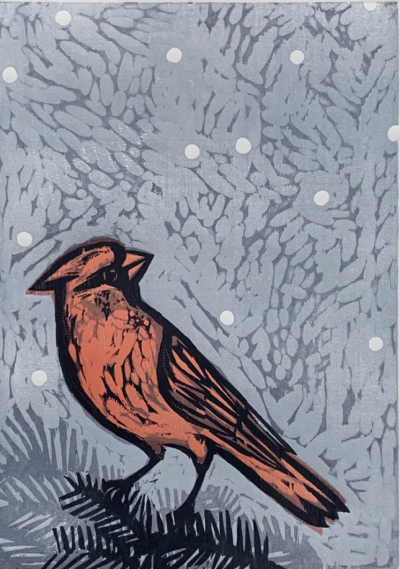
.
Music, birds, nature, climate change, current events – all inspire me to write. Some days an old draft of a poem becomes more relevant because a news event causes me to revisit it, to take it somewhere new.
In recent years, I have become a wannabe astronomer – space exploration and space telescope images often provide topical developments that capture my interest. Once I learned that space is filled with sound, I discovered another element that could link poetry, nature and music, especially given the inspirational role that music plays in getting us out of our comfort zone so we can fly off to different universes, yet still be connected to our companions on earthly ground.
.
.
When Black Holes Collide
Astronomers can now hear sounds made millions of years ago by colliding black holes thanks to data gathered by laser gravitational wave laboratories around the world.
.
Scientists are listening
To the sound track
Of the Universe.
Einstein proves right again.
Ripples of gravity travel
Through dust, wind, darkness,
Stirring up space-time
Like a celestial stew
Where everything is in the mix
But no one knows
What will emerge
When expansion ends.
We can see past light.
Chirps of sound bend,
Twist, turn, tumble,
Lead us backward
To celestial rumbles
In dark corners
Of long dead skies.
Colliding neutron stars
Transform past and present.
As gravitational death
Concerts entertain us,
Each shriek, scream, shout
Tells a tale of tumult.
What fanfare will
follow earth’s departure?
.
___
.
Space Is The Place
“The stars want to speak to you/The planets want to welcome you/
The sun is your very best friend”
…Sun Ra
Fly me to the moon and let me play among the stars/
and let me see what Spring is like on Jupiter and Mars…
…Lyrics by Bart Howard
.
Sinatra’s voice crooned on the moon’s
near side, thanks to Buzz Aldrin, after
he landed Apollo 11. But Sun Ra composed
a score for extraterrestrial space.
Who can know what music might tame
the cosmos, or steer us toward new galaxies?
Sun Ra’s Intergalactic Infinity Arkestra
serenades space travelers as they soar.
Ask any random astronaut what she wants
to hear as she lifts off at light speed toward
another constellation. Chances are high
that Sun Ra’s soundtrack will guide her there.
Let’s all leave this cosmos far behind us,
fraught with its fissures, faults, frailties.
The skyways of the universe are limitless.
All we need to power us forward is curiosity.
Hitch a ride on an asteroid, wave at Saturn’s
shimmering rings, slip slide past the void,
samba over some unknown sun’s fiery furor,
step dance across diamond-strewn dust.
Listen to those vibes, celestes, electric
pianos, siren saxophones, tree drums.
This should be the music of our long-awaited
appointments with brand new destines.
Every universe needs its own symphony.
Look out your rocket window, tap your feet,
clap your hands, shimmy by starlight, shake up
everything. We can make joyous noises together.
Space is the place where everything happens:
Listen to stars speak. Be welcomed by planets.
A brand new sun can become your very best friend.
Accelerate past this time, land someplace magical.
.
___
.
Touring the Galaxies with Jeff Beck
a Fender Stratocaster
rides like a space ship
follow those sounds
around the room
up up up past the ceiling
over the rooftop
way past tree lines
above ragged craggy peaks
beats … blues… bolero …buzz
crying to the moon
everything reverberates
as we rise like astronauts
soaring past everyone
Les Paul …Hendrix …Clapton
as we fly high higher
wah wah wah wah
chords climb …croon …caress
slide …sweep …sing …sigh
slow … slip …soar …roar
rumble …race …rave
we follow the stars
as they glow silver …gold
platinum …plutonium
pandemonium
we jump past planets …comets
meteorites … asteroids
through nebulas … stratospheres
galaxies bend … bow…shapeshift
everything we ever knew
lies.. behind …beneath ..before us
as we watch light bend
wah wah wah wah.
.
…………[Previously published by The New Verse News Jan. 2023)]
.
___
.
Quantum Entanglements
Each autumn, bar-tailed godwits
flap, flap, flap, flap their wings
for days on end. From southern Alaska
to New Zealand. Seven thousand miles.
Some soar three or four miles above ground.
They do not stop for food, water, respite.
Like marathon runners, they bulk up
before flight, double their weight,
use fat for fuel, stay tuned into the zone.
They shape-shift to follow magnetic lines.
When godwits finally land in Christchurch,
bells peal in welcome. In March, their chosen
route of return passes through tidal flats
in China’s Yellow Sea. No one knows how
they stay aloft. Survival demands they move
as one. Their spellbinding stories travel
the globe like Einstein’s theory of relativity.
When light bends, everyone follows its flame.
Perhaps this is optimism defined.
Sing to me. Our harmony will permeate skies.
…………[Previously published by Beltway Quarterly (2023)]
.
___
.
Song for Solar Flares
Something is lighting up our skies.
Is it a supernova or
a solar flare?
Maybe it is arcs of dust and gasses
swirling about like fireflies.
letting off steam.
It’s hard to tell down here.
We earthlings are always
looking for light at tunnel’s end.
We are always dreaming about it.
How it makes us shine.
How we take it for granted.
How we send mirrors into space
In search of memories
to illuminate everything.
Before it all goes dark.
.
.
Watch the 2020 performance of the duo Vintage Blue playing June Carter Cash and Merle Kilgore’s song “Ring of Fire”
.
.
Rings of Fire
Tree rings turn out to be nature’s
Dear Diary. They can tell us when rain
refused to end and when it stopped its fall.
Like Johnny Cash, forests know how
fast a heart can break, how heat
of fire can burn, burn, burn.
A Bosnian pine tree named Adonis
has stood in Greece for a millennium.
It speaks to jet streams, hears star secrets.
In Colorado, a twenty-year drought sets
records as river waters evaporate.
Blue spruce chronicle their migration.
When volcanoes blew their tops or desert
climates pushed north like arid armadas,
bristlecone pines recorded each maneuver.
As nomads scattered like their failed crops
of corn, beans and squash, their exodus
story was written in concentric coils.
A chiaroscuro of cosmic rays
and solar flares dance across Japanese
cedar tree circles. They carry messages
as prescient as ancient Anglo-Saxon
Chronicles or Dead Sea Scrolls. ..Collapsed
empires etched, like poetry, in grains of wood.
We tumble into burning rings of fire while
our ancient chroniclers turn pale as shadows.
As they watch everything go down,
down, down, narrative no longer captures
our descent. Flames rise higher. Metaphor
vanishes. Next, meter, rhyme. Then memoir.
.
The Laboratory of Tree Ring Research, founded by an astronomer in the 1930’s, holds more than half a million tree ring samples which reveal a tree’s age as well as historical data about annual temperatures, precipitation, fire activity, climate change and jet stream activity.
.
.
_____
.
.
“Moon Vigil” © Kent Ambler.
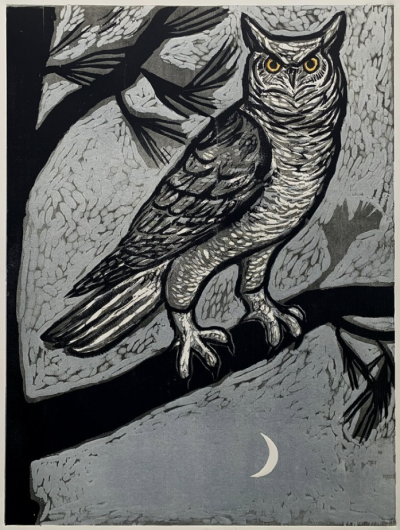
.
Between climate change, disappearances of birds and other species, and the divisive state of our world, I try to create poetry that conveys the need to change our human behaviors before it is too late. Even when a specific reference to music is not featured in a particular poem of mine, my hope is that the poem’s rhythm, line, word choices and sound can transport a reader to a different plane or space. Ideally, a poem might prompt an action (or reaction) that could make a difference to others. Or perhaps, as birds or music can do, make the audience stop for a moment and experience awakening, escape, joy.
.
.
Where The Wild Things Were
At some point we all wanted to be Flaco.
To rise above our circumstances,
escape our confined lives,
take flight in open spaces
once known as dreams.
To perch high enough that our
imaginations cannot be captured.
To gain perspective on those details
of our former lives closer to ground
that went missing each day.
At treetop height, our diary of daily
exploits expands like open secrets,
while our fears are as useless as yesterday’s news.
Watch us in awe as shadows of our wings
recede into the far distance.
Up here, we listen to wind symphonies,
sway to syncopated beats of raindrops
on balcony ledges, fire escapes, water towers.
We watch sunsets morph from marigold to auburn
to mauve. Aloft, we leap, linger like Nijinsky.
Some said survival was sketchy.
Wild creatures face too many obstacles –
best to keep them caged for longer life.
But they forgot about the thrill of open skies.
How memories expand when airborne.
.
Flaco was a male Eurasian eagle-owl who escaped from New York City’s Central Park Zoo in early 2023 and remained loose in Manhattan for a year until he died, apparently after crashing into a window.
.
…………[Previously published by The New Verse News in February, 2024)]
.
___
.
a change is gonna come (songbird versions)
a change is gonna come
so says Sam Cooke
so says some babbling brook
a barn owl says look
this morning’s a hymn book
some nights turn crappy
but we can get happy
if we’re on the Mississippi
on a ferry from Algiers
gonna be no more tears
a change is gonna come
so says John Boutté
so says a blue jay
long time coming my way
perched on a birch
it’s almost March
and that means spring
just listen to me sing
whatever’s up there in that sky
gonna help me get by
a change is gonna come
so says Otis Redding
we’re all born by the river
his version sends a shiver
it’s a hard living time
when trumpets whine
from a Jackson Square second line
to the Lower Nine
when birds begin humming
gonna be some strumming
a change is gonna come
so says Aretha Franklin
she feels so so so good
she explains why we should
keep hope alive let it fly
what’s up there in that sky
that song you heard
from a northern mockingbird
has the last word
no more dreams gonna be deferred
a change is gonna come
so says Aaron Neville
I’m down on my knees
please help me please
in warmer nights
in mourning dove flights
in sweet song jazz delights
hear my notes soar upright
stay crowned by the river’s light
a change is gonna come
yes it will
oh yes it will
.
.
Listen to John Boutté perform “A Change Is Gonna Come” [CD Baby]
.
.
what is a dream after all
what is a dream after all
maybe it’s a bird
soaring south over checkered corn
lime green grasses silken wheat
riding wind columns
like a hobo on the rails
or is a dream a voice
that coaxes us toward safety
or escape …or a long walk
through a desert
clutching a rosary
and a half-empty bottle of stale water
maybe a dream can walk
out of a convenience store
light up a new cigarette
joke with friends
drive home listening to
Ain’t Nobody’s Business
maybe a dream… is louder than we think
maybe it could wake up a crowd
imagine how a dream might swim across a river
and emerge clean and rested and whole
on the other side …safe in a parent’s arms
ready for a new life
.
Listen to Mary K O’Melveny read “what is a dream after all”
.
.
Mourning Dove Portfolios
Outside my window, four doves converse
on spider webs of oak and maple branches.
Fattened by bird seed, they peer out
over the long-wintered meadow
like savvy scouts searching the scenery
for signs of trouble ahead.
I want to call out that trouble, indeed,
has arrived. The work of doves has never
been so essential. As they shake
out their grey feathers against these
sharp winds, I am betting on savvy
instinct. Our Capitol is under siege.
Some days I can hear their whistle –
a high-pitched whine from their wings
designed to scare off predators. Their
pigeon relatives flew messages for kings
and armadas, Caesar and Genghis Kahn.
Imagine the noise they must have made.
Most doves have ten thousand feathers.
In a dream I watched as flocks circled the mall,
wings whinnying beneath a pale sun.
In the beating, bleating air, fluff, tufts,
plumage sifted down, cushioned the ground.
Soon silence was everywhere. Soft as snow.
.
___
.
Hot Flashes
I lie awake wondering if salvation
can befall my planet – I’m as haunted
by the question as a Pentecostal supplicant
awaiting some death-bed revelation.
The universe is eerily quiet
as I review solemn lists of species
soon-to-vanish. My head nods in rhythm
but sorrowful passings yield no sleep.
At earth’s bottom, a state-size chunk
of ice sighs into wind then breaks away.
I imagine it sounds like cymbals clashing,
crashing, thrashing in the dark waters.
It seems as if everyone is too stunned
by inevitable goodbyes to try to stop
our downward arc. Sometimes there is beauty
in final departures, distracting us
like the incandescence of fire
before grey ash settles over the forest
or waterways thickened by phosphorescent
algal blooms fan out like liquid rainbows.
Even where natural colors have slimmed down
like hollowed coral reefs as bleached as
an O’Keefe skull, we still search for hints of stars
hoping signs of inexorable exit are premature.
Desert floors crack beneath relentless suns.
As they shrink down, I think of clay ovens
baking hot winds into sturdy vessels
where bold imaginings of rain might form.
Land and sea mourn their islands
who disappear like runaway children.
One, in Louisiana, seen from above, looks like
old lace curtains decomposing in unforgiving light.
Little remains for native denizens to fish or hunt.
Yet another story of stolen tribal lands
is told, even as they tend to the
waterlogged graves of their ancestors.
Soon enough, flood waters rise up
over my head. Houses, cars, trees,
light poles, refrigerators all float past
faster than anyone can swim.
No wonder sleep is difficult.
As dreams of territorial erasures vie
with other losses for our attention,
my body heat creates new climate zones.
.
.
“Sundown” © Kent Ambler.
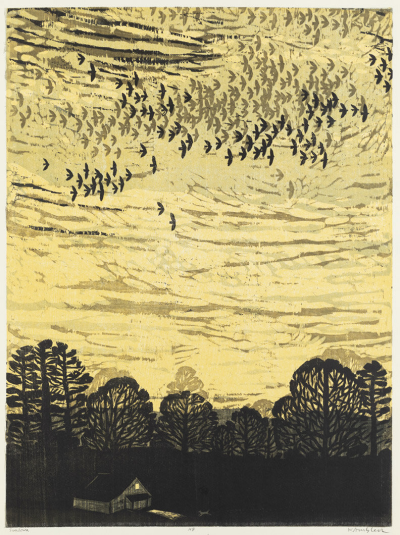
.
.
If You Want To Go To Heaven
In a tree by the brook, there’s a songbird who sings/Sometimes all
of our thoughts are misgiven/Ooh it makes me wonder…
Stairway to Heaven by Robert Plant & Jimmy Page
If you want to go to heaven, follow a songbird.
Anybody with feathers will do — it could be a claret-
splashed cardinal or his orange-dusted mate— see
them soar straight from a lush white hydrangea tree
to a leafy, peachy golden honeysuckle bush.
Listen to notes slide out from a freckle-chested
wood thrush from its hide-out in a petal-filled lilac
as it seizes some breeze, teases us with tales of freedom.
Pathways defined by siren songs beckon us far above
horizon lines, implore us to ignore fears, savor dreams.
If you want to go to heaven, greet a pair of bald eagles
as they retreat from their nest at dawn to rest astride
a pine forest canopy encircling an aging reservoir.
They whistle like flute players. Sweeping brushstrokes
of their wings decorate a sky’s canvas with delicate
haikus. They recall the pall of winter weeping – ice-sheared air,
a moon turned blue, extra feathers swelling to stay warm.
Still, like minstrels everywhere, they prepare with care
for spring’s debut. Birds know how music cures despair.
Follow them to celestial fanfare, to galaxies unknown, new.
Some say heaven can be reached by many means —
stairways, ladders, prayers, cellos, orchestras, a lone guitar.
Musicians, like magicians, improve our views, move us
away from obstacles, help us groove through life’s imbalances,
opportunities promised. This is the rarest of provinces:
we improve one chorale, one riff, one backbeat at a time.
Like Leonard Cohen as he lifts us aloft with hosannas,
hallelujahs, secret chords, songbirds put hope on display
as they sail away like some veteran piano soloist
closing with a grand glissando, then a final, mellow note.
.
.
_____
.
.
“Nine Song Birds” © Kent Ambler.
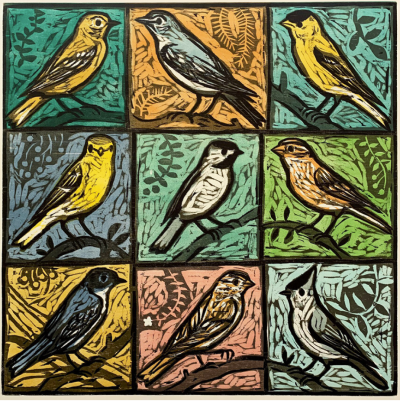
.
.
___
.
.
Listen to the 1984 recording of Leonard Cohen performing his composition “Hallelujah” [Columbia]
.
.
_____
.
.
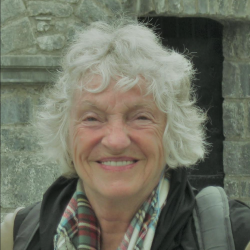
Mary K O’Melveny is the author of four books of poetry and a co-author of two anthologies of writing by The Hudson Valley Women’s Writing Group, of which Mary has been a member since 2015. Her most recent collection, Flight Patterns (2023), was nominated for the Eric Hoffer Book Award. Her other volumes, Dispatches From the Memory Care Museum (2021), Merging Star Hypotheses (2020), and A Woman of a Certain Age, (2018) included many award-winning poems. Merging Star Hypotheses was short-listed for The Washington Prize, sponsored by The Word Works. Mary has been twice nominated for a Pushcart Prize and was recently named by Billy Collins as the Second Prize winner in the 2024 Fish Poetry Competition for her poem “Writing About The Invisible,” which will appear in the Fish Anthology 2024.
Mary’s poems have also appeared in many print and on-line literary journals and anthologies and on international poetry blog sites. Mary was a “Highly Commended” Finalist for the 2020 Anthology Magazine Poetry Prize and an award-winner in poetry competitions sponsored by The Poet’s Billow (Pangaea Prize, Atlantis Award), Writer’s Digest, Tom Howard/Margaret Reid Award (sponsored by Winning Writers ), Slippery Elm Literary Journal, Raynes Poetry Competition and the 2020 Poems of Political Protest Competition sponsored by City Limits Publishing.
Click here to visit her website
.
.
___
.
.
About the artist
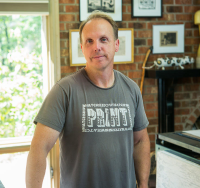
Kent Ambler is a printmaker and painter who lives in Greenville, South Carolina. He attended Ball State University and graduated with a Bachelor of Fine Arts in Painting. He has been a full-time artist since 1997.
He was introduced to printmaking in college. The woodcut print process “clicked” with him so instantly and naturally that the other students and professor thought he had already had experience creating them. Woodcut prints are his medium of choice, and he creates loosely cut prints based on everyday events and objects.
Click here to visit his website.
.
.
.
___
.
.
Click here to read Proceeding From Behind: A collection of poems grounded in the rhythmic, relating to the remarkable, by Terrance Underwood
Click here to read In a Place of Dreams: Connie Johnson’s album of jazz poetry, music, and life stories
Click here to read The Sunday Poem
Click here to read “A Collection of Jazz Poetry – Spring/Summer, 2024 Edition”
Click here to read “Ballad,” Lúcia Leão’s winning story in the 65th Jerry Jazz Musician Short Fiction Contest
Click here for information about how to submit your poetry or short fiction
Click here to subscribe to the (free) Jerry Jazz Musician quarterly newsletter
Click here to help support the ongoing publication of Jerry Jazz Musician, and to keep it commercial-free (thank you!)
.
___
.
.
Jerry Jazz Musician…human produced (and AI-free) since 1999
.
.
.



































It’s an audio-visual treat to read such lyrical & wonderful poetry,
and to listen to classic jazz pieces whilst viewing beautiful wood
cut prints of birds. Mary’s readings of a few poems and her
commentary is illuminating. Brilliant compilation Joe:
multi-dimensional; mesmerizing; Magical!
What a delight!
Mary O’Melveny’s insightful and sensitive poetry and her readings, Kurt Ambler’s enchanting and beautifully designed woodcuts, and wonderful music from many of our favorite composers and musicians, all came together so appropriately to craft this wonderful, well-balanced collection to savour again and again. Thank you to Joe and to all for your dedication, talent and hard work to create such an incredible convergence of art, words and music.
If you want to go to heaven, watch this!